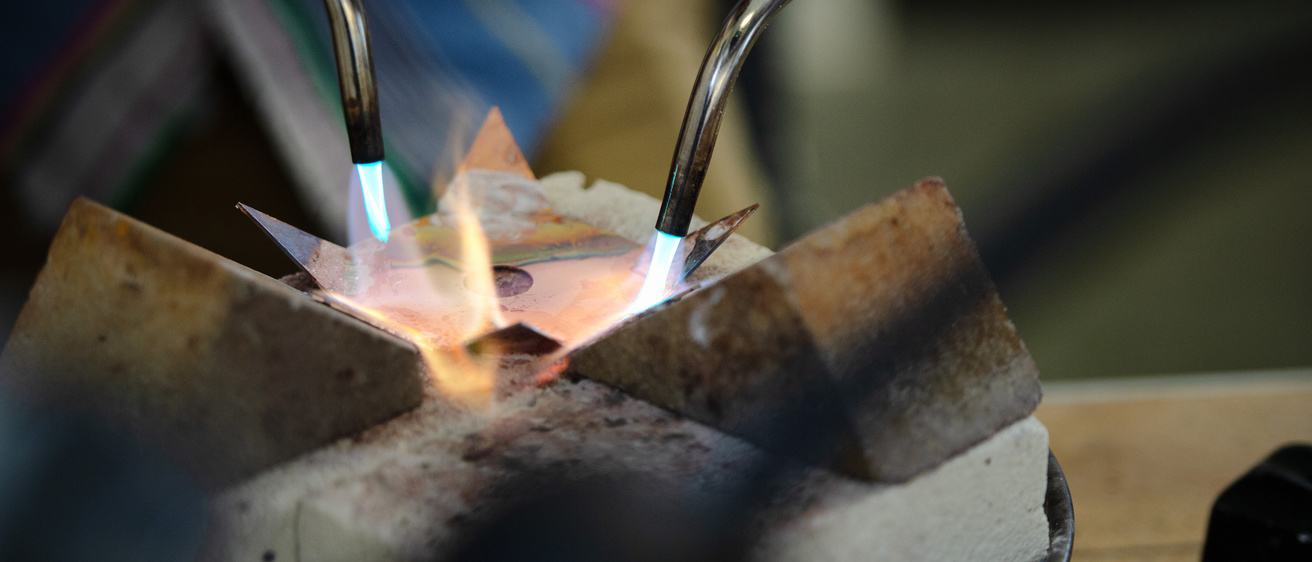Main navigation
The Jewelry and Metal Arts Graduate Program offers a comprehensive three-year Master of Fine Arts (MFA) degree
The Iowa MFA in Jewelry and Metal Arts provides you with an immersive educational experience that fosters artistic development and technical proficiency. Through rigorous coursework, hands-on practice, and access to the most complete, state-of-the-art facilities in the country, Iowa you will refine skills in various techniques such as raising, fold forming, anodizing, electroforming, casting, soldering, TIG welding, and stone setting. This comprehensive training equips you with the expertise necessary to navigate the complexities of the contemporary jewelry and metal arts field.
An Iowa MFA cultivates critical thinking, tool knowledge and conceptual development. We emphasize the importance of contextualizing your work within broader artistic movements, societal issues, and the history of craftmanship. By engaging with design, art history, theory, and criticism, students learn to articulate their artistic vision effectively. This intellectual rigor is set side by side with digital prototyping knowledge and traditional hand tool skills to enhance the depth of your work and prepare you for careers in the field. Graduates have become gallery owners, self-staining studio artists and professors.
An Iowa JMA MFA can significantly expand professional networks and career opportunities. Our program features collaborations with established artists, industry professionals, and fellow peers who share similar passions. These connections can lead to exhibitions, internships, or job placements post-graduation. Obtaining an Iowa MFA in Jewelry and Metal Arts is a transformative journey that enriches both personal artistry and professional prospects.
Incoming graduate students meeting all requirements will be offered a TA position teaching a beginning-level jewelry and metal arts class. Each TA position will be renewed each year and grants a full tuition scholarship and monthly stipend. Graduate students may also be given the opportunity to work as studio monitors, allowing for further useful professional experience and meaningful contributions to the UI metal arts community. Additional scholarships are available through the School of Art, Art History, and Design, and department-specific funding for travel and advanced projects may be applied for through a written proposal.
All jewelry and metal arts graduate students are granted a space in the JMA MFA studio. This secured workspace has 7 individual stations that include jeweler’s benches with flex-shafts, work desks, and personal storage. The space also includes two soldering stations with ventilation, a utility sink, and a collection of community tools. The large windows and abundant natural light make this an ideal workspace that facilitates individual research in a shared-resource setting.
Our state-of-the-art facility is well-equipped to accommodate diverse directions of student work in both traditional and advanced techniques. It encompasses a 250-gallon electroforming tank, 130-gallon aluminum anodization unit, and a wide variety of tools for both large- and small-scale mixed media projects. Access is also provided to our advanced prototyping suite which includes an industrial CNC mill, lathe, laser cutter, and plasma cutter. Our new facility is well-ventilated and organized for safe and efficient operation. For more information about our facility, please see our program overview here.
MFA students are challenged to refine a variety of traditional, contemporary, and innovative metalworking techniques to produce high-quality professional portfolios. We encourage collaboration and interdepartmental exploration, allowing students to find their voice in our field. Outstanding works of our alumni have been acquired by major museums, including the Metropolitan Museum of Art, the Museum of Art and Design, and the Cooper Hewitt, Smithsonian Design Museum.
The Iowa metal arts handmade bicycle courses recognize the bicycle as an object of adornment, intertwining craftsmanship with personal identity, that transcends utilitarian function. Through the generative relationship between, design, fabrication, craftsmanship, engineering, and aesthetics, handmade bicycles are expressions of engineering purpose and aesthetic exploration. The artisanal approach to bicycle design emphasizes unique materials, intricate detailing, and personalized features, elevating the bike from a functional object to artwork. This transformation reflects broader cultural trends that prioritize sustainability and artisanal production.
The aesthetic appeal of handmade bicycles is rooted in their bespoke nature. Artisans often employ traditional metal working techniques alongside modern tool and material innovations to create bikes that resonate with both historical significance and contemporary relevance. The choice of materials we use in the program — titanium and CroMo steel—enhance engineering, visual allure and the environmental consciousness associated with cycling culture. Each handcrafted bike made in the bike studio serves as a canvas upon which to showcase expertise and reflects personal narratives through customized designs.
The burgeoning community surrounding handmade bicycles fosters a sense of belonging among enthusiasts who appreciate both form and function. Events such as custom bike shows or artisan markets provide platforms for sharing knowledge about craftsmanship while celebrating the artistry involved in bicycle making. This communal aspect reinforces the idea that these bikes are more than mere objects; they represent a lifestyle marked by creativity, sustainability, and individual expression. Handmade bicycles serve not only as practical vehicles but also as significant adornments within modern culture.
Jewelry and metal arts faculty
Jewelry and Metal Arts faculty

Lonna Huisingh (Keller)

Steve McGuire
Jewelry and metal arts studio specialist

